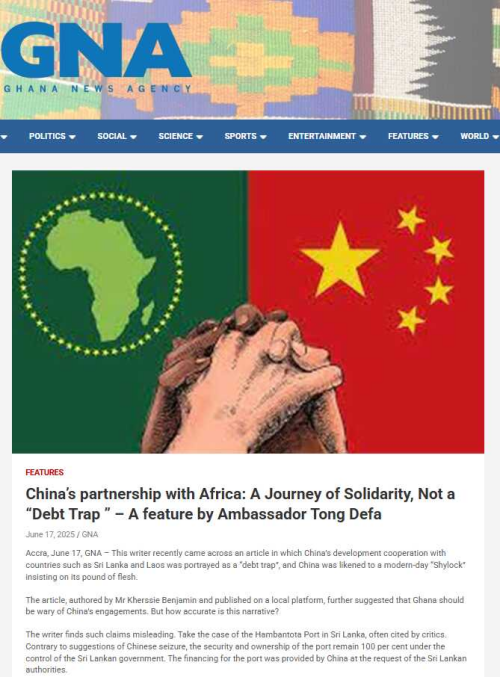
People’s Republic of China


On 17th June, Ambassador Tong Defa published a signed article titled “China’s Partnership with Africa: a Journey of Solidarity, not a ‘Debt Trap’” on Ghana News Agency. The full text is as follows:

Recently, I’ve noticed an article by Mr. Kherssie Benjamin, assuming that China’s cooperation with Sri Lanka and Laos in building the Hambantota Port and power grid is a “debt trap”, and China is Ghana’s “Shylock”, insisting on its pound of flesh (For details: https://www.modernghana.com/news/1404209/wake-up-ghana-china-is-coming.html). But is it true?
The security and ownership of the Hambantota Port are 100% on the Sri Lankan side. Chinese finance for the port came from the request of Sri Lanka. Former Sri Lanka’s Ambassador to China H.E. Palitha Kohona has said that 80% of Sri Lanka’s foreign debt is owed to multilateral institutions such as the World Bank and the Wall Street investors, and its debt to China only occupies 10% of the total. LaoMinister of Energy and Mines Mr. Phoxay Sayasone has stated that the China-Laos Interconnection Project, as a strategic initiative in Laos’s energy sector, will better support the country’s economic development, helping Laos develop into a regional hub for energy connectivity.
Statistics from the Ministry of Finance of Ghana has shown that, before Ghana sought assistance with the International Monetary Fund (IMF) in 2022, Ghanaian Government’s total public debt was 54.4 billion USD, of which external debt was 28.1 billion USD, accounting for 51.7%. Among which, Eurobonds and multilateral debt was as high as 21.1 billion USD, accounting for 76% of the external debt. While Ghana’s official debt to China was only 1 billion USD, accounting for 3.6% of Ghana’s external debt and 1.8% of its total public debt. Since Ghana’s debt distress arises, China has concerned about Ghana’s urgent needs and served as co-chair of Ghana’s Official Creditors Committee, actively playing a coordinating role to help Ghana accelerate its debt restructuring process.
In fact, the Western investors, often in the forms of multilateral financial institutions and commercial creditors are the largest creditors of Africa. Statistics from the World Bank 2024 International Debt Report has shown that, 36% of Africa’s external debt comes from multilateral financial institutions and 43% from commercial creditors. Together, they account for nearly four-fifths of Africa’s total debt. Unfortunately, multilateral financial institutions refused to adopt relief measures under the Common Framework for Debt Treatments beyond the G20 Debt Service Suspension Initiative for Poorest Countries (DSSI), forcing Africa’s bilateral official creditors to offer debt relief. They claim that this would be good for Africa, yet truth is, this would only cost Africa once again its access to the international financing market.
A UK-based NGO Debt Justice Group estimated that 35% of Africa’s external debt come from Western private financial groups, which is three times more than China, charging double the interest in the process. In the past, China’s assistance to Africa was mainly in the forms of grants and interest-free loans, and most of the interest-free loans have already been waived. In recent years, China has carried out financing cooperation with Africa at a faster pace to meet their strong needs for such cooperation. In the mean time, China has dedicated to easing Africa’s debt pressure. China is fully implementing the G20 DSSI, and has put off more debt payments than any other G20 member. Research at Johns Hopkins University found that, between 2000 and 2019, China cancelled 3.4 billion USD of debt in Africa and a further 15 billion USD was refinanced. No assets were seized by China.
China has never attached any political strings to debt agreements, never forced any African country to take out loans, and never pressured any African country to repay loans. Not a single African country slid into debt predicaments just because it has financing cooperation with China. To date, by taking various funds, Chinese companies have helped Africa build and upgrade over 10,000 kilometers of railway, around 100,000 kilometers of highway, 1,000 bridges, 100 ports, and many large-scale power plants, hospitals and schools. The main and annex buildings of the Ministry of Foreign Affairs, the University of Health and Allied Sciences, the Jamestown Fishing Harbor, the China-Ghana Friendship Hospital (Lekma Hospital), the National Theatre, etc. aided by Chinese government, as well as the power plants, ceramic factories, cement companies, steel plants, airlines, etc. invested by Chinese companies have played an important role in providing employment and promoting economic growth in Ghana.
Please think for a moment, what is the real intention of those who concocted and advocated the “debt trap”? Is it really for Africa’s sake? Or to undermine China-Africa cooperation and hold back Africa’s industrialization and efforts toward economic independence? What they want is to plunge the African continent into the “trap of underdevelopment”.
Facts speak louder than words, and justice is in people’s hearts. At the 2024 Beijing Summit of the Forum on China-Africa Cooperation (FOCAC), African leaders spoke highly of the China-Africa cooperation, and expressed their desire to strengthen collaboration with China in investment, financing and other areas, in an effort to drive the region’s sustainable development. Just on June 11 2025, China announced zero tariff to 53 African countries having diplomatic relations with China, which is highly commended by African brothers and sisters, especially at the time when someone is waging high tariffs on the continent. It is a reflection of the attitude of African countries and people, and a compelling answer to whether China-Africa financing cooperation is good or not. We hope that our Ghanaian friends can recognize the truth about the so-called “debt trap”. We also advise the individual reporters and medias to respect the truth, stop hyping up the so-called “debt trap”, and make more favorable efforts to contribute to Africa’s development.


